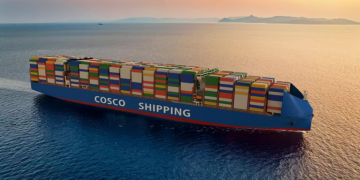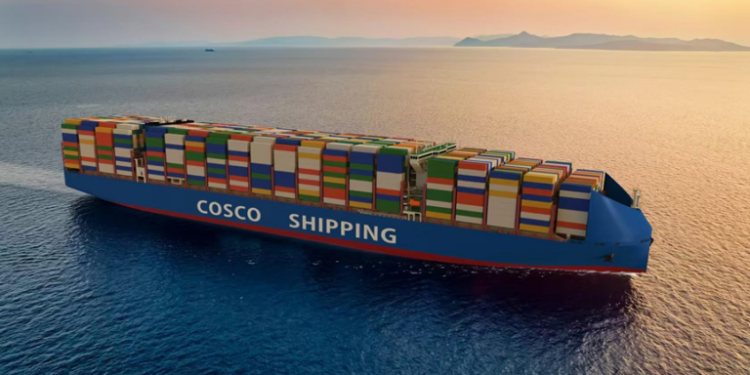By Eva Richardson | The Logistic News
In a move that could reshape diplomatic and commercial ties between the world’s two largest economies, COSCO Shipping Holdings, China’s flagship state-owned carrier, has publicly opposed a new series of U.S. port surcharges aimed at foreign state-backed operators. The company denounced the measures as “politically motivated and operationally disruptive,” raising alarm across the global maritime sector about a potential wave of retaliatory policies.
The fee policy, quietly introduced at several major U.S. ports earlier this month—including Long Beach, Houston, and Charleston—targets shipping lines with partial or full state ownership, which port authorities argue raises security and compliance concerns. COSCO, which has long been at the center of scrutiny for its strategic port investments worldwide, is directly affected.
COSCO Responds: “This Is About Politics, Not Ports”
In an official statement issued late Monday, COSCO accused U.S. regulators of creating a de facto blacklist based on corporate nationality rather than conduct or compliance. The company claims the surcharges, which add additional costs per port call for affected carriers, are a thinly veiled attempt to discourage Chinese shipping lines from operating in U.S. waters.
“This is not a fee—it’s a message,” the company wrote. “A message that undermines the foundational principle of equal maritime access.”
According to internal COSCO sources, the charges could inflate their North American operating costs by 12%, prompting a reassessment of routing strategies and potentially limiting frequency on less profitable transpacific legs.
U.S. Officials Emphasize Transparency and Infrastructure Control
U.S. port authorities, supported by federal advisors, defend the fees as necessary steps toward securing critical logistics gateways. Officials point to increasing concerns about the influence of state-owned firms over terminal operations, digital tracking systems, and port infrastructure in strategic regions.
“This is about knowing who controls the infrastructure and how that control is used,” a Department of Transportation official told The Logistic News on background. “Ports are not just business zones—they’re national infrastructure nodes.”
Industry on Edge: Risk of Retaliation and Rate Shocks
The response across the global freight community has been one of concern. Several international freight forwarders and trade groups fear the decision could lead to a tit-for-tat response from Chinese port operators—who may begin applying mirror surcharges to American or allied carriers.
For shippers, the bigger worry is instability. If port access begins fluctuating based on political alignment, reliability in the global schedule could deteriorate rapidly.
“This puts global schedules at risk,” said the director of operations at a European logistics firm. “We can’t optimize supply chains in a climate where policy outranks performance.”
Strategic Control or Strategic Overreach?
COSCO’s protest also revives the debate about how far national governments should go in reshaping logistics rules in response to geopolitical shifts. While the West has long criticized China’s Belt and Road infrastructure expansion as a tool for influence, critics now say the U.S. risks engaging in its own form of infrastructure weaponization.
“The danger is that we normalize selective access,” warned an international shipping lawyer based in Singapore. “That’s not competition—that’s fragmentation.”
What Happens Next?
COSCO has not ruled out escalating the matter via the World Trade Organization or through diplomatic backchannels. Meanwhile, industry watchers say the next 30 to 60 days will be critical, as other Asian carriers monitor whether the policy expands, and if China retaliates through its port network.
One thing is clear: in the race to control the movement of goods, ports are no longer just stops on a route—they’re leverage points in an unfolding global power equation.























